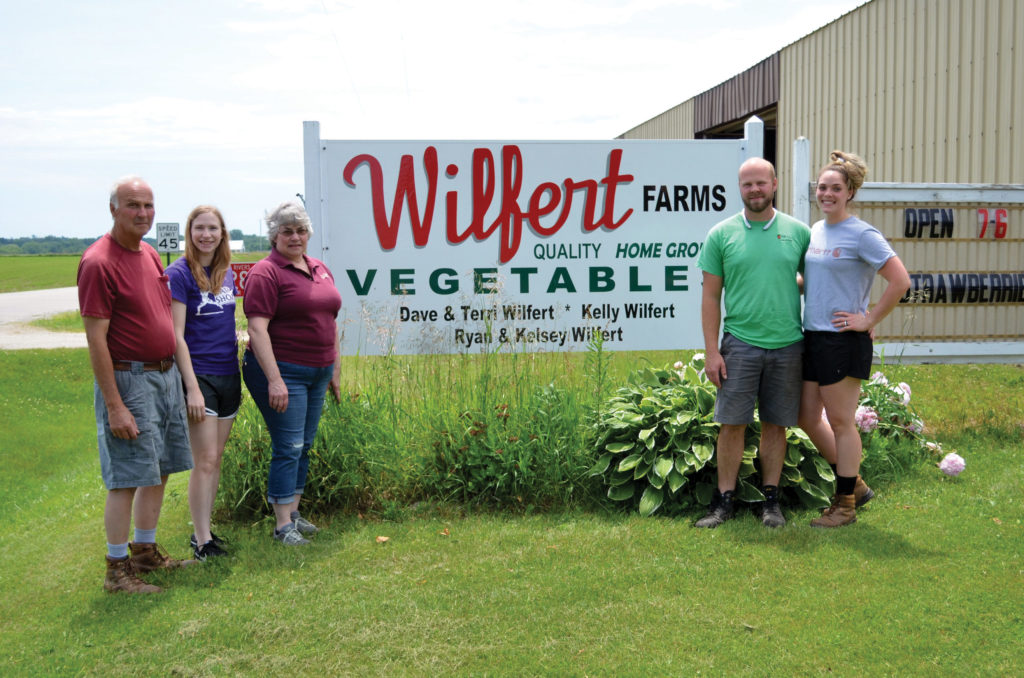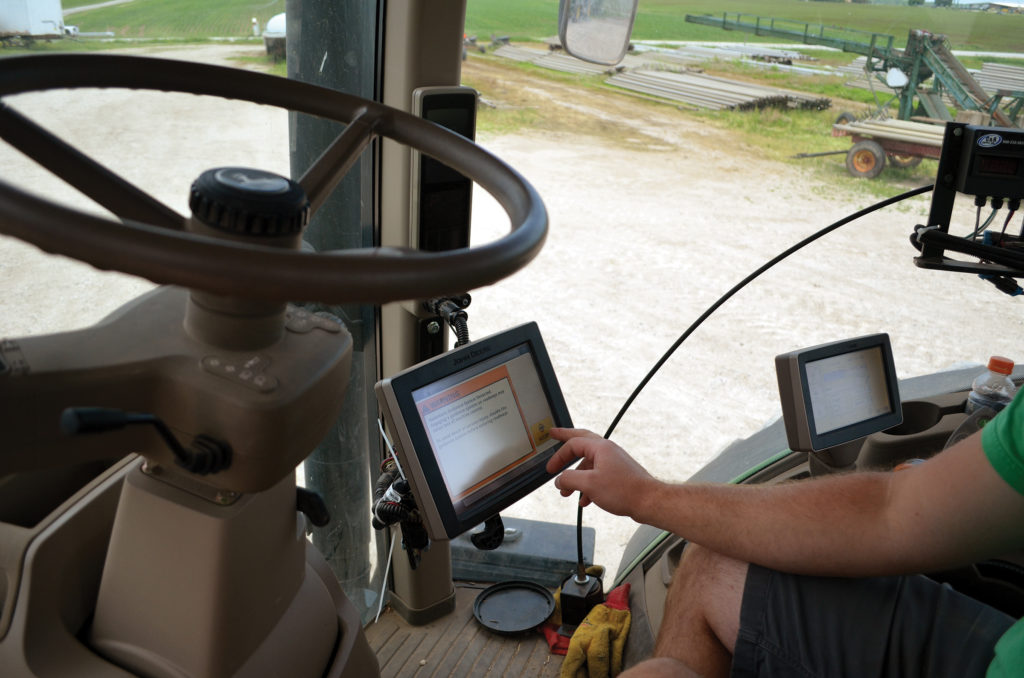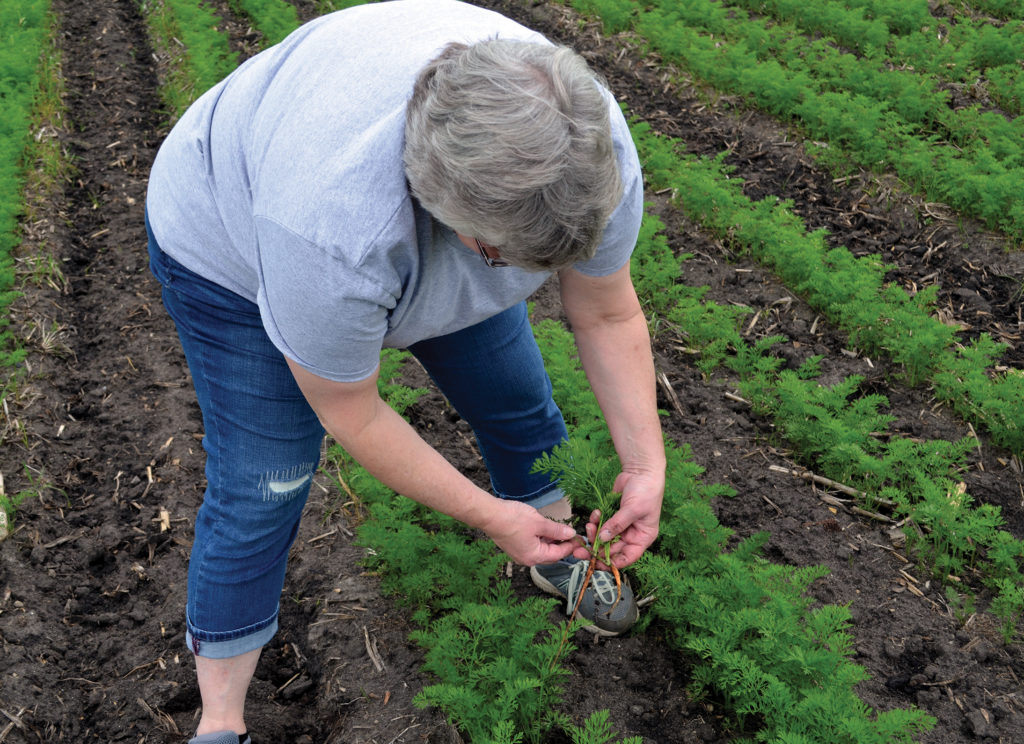 Wilfert Family Uses Technologies to Grow Quality Produce
Wilfert Family Uses Technologies to Grow Quality Produce
As owners of a 143-year-old family farm, Dave and Terri Wilfert embrace technology and advocate for agriculture while providing quality produce for their customers.
Wilfert Farms LLC in Two Rivers is the largest fresh market farm in east central Wisconsin. The farm includes cash crops, processing carrots and fresh produce. New to the table, the farm also sells farm-raised, locally processed beef with a family connection. The Wilferts share ownership of this legacy with their daughter Kelly, their son Ryan and his wife Kelsey, who are the fifth generation.
Using Technology

“America does agriculture better than any place in the world,” said Ryan, who attended UW-Madison’s Farm & Industry Short Course. “I’ve grown up in agriculture and have seen first-hand how vital it is to our local community.”
Science, precision agriculture and technology play major roles on today’s farms.
“Implementing technologies keeps our farm producing the highest quality vegetables, crops and produce and improves our production each year,” said Ryan. “Seeing the results is the fun part of farming. It’s important to see a quality product in demand by the public as people learn more about how food is grown.”
For example, by using the precision of GPS, the Wilferts use the same track for planting and spraying crops, saving time, money and resources and reducing their carbon footprint.
“By using real-time kinematic or RTK, which is the most accurate application available, it allows for sub-inch precision and accuracy for every application from planting to spraying to tillage,” added Ryan. “It reduces overlap and prevents misses. In vegetable farming, consistent application is very important.”
He explained that precision is essential when planting 24 to 36 rows of a crop per week to allow for staggered harvest, it is important not to overlap or have misses.
“You simply return to the field and pull in next to where you planted and can be confident that everything will line up as if you planted the field at the same time,” explained Ryan. “This is the same for spraying. Accurate GPS plays a huge role in making sure that I am applying product exactly where I need it at the correct time.”
Ryan explained that they also use the RTK signal for drain tile installation.
“Sitting in the cab of the tractor we can create elevation maps and topography with the GPS,” added Ryan. “Then we can install drain tile on the correct grade and consistently at the correct depth across the field. It also allows us to determine if we can place the tile in the ground and have the water flow the direction that we want it to, before we even put the tile plow in the ground.”
Growing the Best Produce

The Wilferts own 300 acres and rent an additional 400 acres from a family member. They plant field corn, soybeans and wheat to make straw for the strawberries. They also schedule and manage multiple plantings of produce including sweet corn, strawberries, peas, cauliflower, broccoli, peppers, onions and other vegetables. It doesn’t stop there though, the family also grows carrots and snap beans for processing.
Growing a total of 30 different crops, staggered plantings extends the availability of produce to customer throughout summer and fall.
“To ensure the quality of our produce, it is hand-picked, hand-washed and hand-sorted, and can be on your table hours after leaving the field,” added Dave, who earned his degrees in marketing and economics from UW-Oshkosh. “We want it to be all about taste and quality, and our family and employees are proud about making that happen. Our motto is “We may not be the biggest, but we’re always trying to be the best.”
Field Crops
The Wilferts use field crops such as wheat, corn and soybeans as rotational crops for the vegetables.
“Crop rotation helps return nutrients to the soil naturally,” said Ryan.
Each year weather is a challenge for the Wilferts.
“This year we are considerably drier as compared with last year,” added Ryan. “But we’ve also had to contend with cool temperatures, for example, in mid-June we had to irrigate the strawberries to keep the blossoms from freezing. This works because heat is released as water freezes.”
Dave added that because of the farm’s vertical integration and their ability to control the processes, reduce costs and improve efficiencies, their farm remains profitable.
Beef, An Added Product
This spring Dave’s sister and her family lost access to their processing plant due to the coronavirus outbreak. The family contacted a local processor but needed a place to sell the beef.
“We purchased a freezer for the farm market and filed for licensing and permits to sell retail beef,” said Kelly, who recently graduated from UW-Madison Law School and is working for Investors Community Bank in Manitowoc. “From there, it took off like wildfire. Consumers contacted us about purchasing and it was gone within days and continues to sell out as quickly as the freezer is filled.”
Dave predicts that Wilfert Farms will come around full circle by integrating the sale of beef along with the field crops and produce.
“We’ve seen the benefits of this in agriculture and that customers want to know where their food is coming from,” added Dave. “Customers want to trust their farmer and Wilfert Farms wants to be their farmer.”
Growing Processing Vegetables
Wilfert Farms also grows vegetables for processors.
“Since 1984, we have worked with major processors of vegetables,” adds Dave. “At the turn of the century, we were growing and supplying one percent of the processed carrot tonnage in the U.S. or about five percent of the processed carrot tonnage in Wisconsin.”
This year marks the 37th year of the business relationship between Wilfert Farms and Lakeside Foods, the second largest canner in the U.S.
“Lakeside Foods purchases 100 percent of our carrot crop,” says Dave. “This year, we will ship between 2,500 to 3,000 tons of carrots from 100 acres.”
It’s a Different Year
Terri explained that following the Food Safety Modernization Act of 2011, the farm’s sanitization routines were adjusted to meet national standards; however, due to the coronavirus pandemic, they’ve made some additional adjustments.
“The challenge is finding the sanitizer and disinfectants,” said Terri.
She also said that they ask customers, “To take what they touch.”
The Wilferts do not have full-time employees, but upwards of 20 seasonal, part-time workers. During the growing season, crews are in the field seven days a week.
Ryan’s wife, Kelsey, is a nurse at Aurora BayCare Medical Center in Green Bay. On her days off, she helps on the farm and said she wouldn’t trade it for anything.
“To work alongside Ryan and his family and to witness their passion and the effort they put into growing quality vegetables and produce for their customers is amazing,” said Kelsey. “Many of the customers have been coming to the farm store for years and come for the quality.”
Terri, Kelly or other employees go to the Manitowoc Farmers’ Market on Saturdays where they sell about 25 to 30 percent of the Manitowoc Farmers’ Market’s total sales. With the challenges of coronavirus and the lack of workers, they have only recently been able to attend the market this year.
Farm Bureau Membership

The Wilferts have been Manitowoc County Farm Bureau members for several years and recognize the value in their membership. While attending UW-Madison, Kelly served as a county board member and Collegiate Farm Bureau officer. She won the 2016 WFBF Collegiate Discussion Meet and advanced to the Final Four round of the AFBF Collegiate Discussion Meet. In 2018, she won the WFBF Young Farmer and Agriculturist Discussion Meet and again advanced to the to the Final Four round of the AFBF Young Farmers & Ranchers Discussion Meet, finishing third overall. She also completed an internship with AFBF in Washington, D.C.
“Farm Bureau helped me to build a professional and social network of farmers across the state and nation,” said Kelly. “It’s more than who I get to meet though – it’s the learning and member benefits that keep me coming back. Discussion Meet developed skills that I use every day in advocating in corporate boardrooms. It’s been a pleasure to see the policy impact of Farm Bureau’s advocacy and know that being a Farm Bureau member lends weight to my voice on Capitol Hill.”
Community Involvement
Wilfert Farms LLC was recognized as Small Business of the Year by the Chamber of Manitowoc County.
The family contributes more than 10,000 pounds of food to local pantries. Dave is involved and serves as director for the Manitowoc Chamber of Commerce, FFA Alumni, Mishicot Ag Advisory Board and the Mishicot High School Advanced Career Placement Board.
Terri serves on the Wisconsin FFA Alumni Council, Board of Wisconsin Fresh Marketing Vegetable Growers Association, the Farmers’ Market committee and previously on the county FSA committee.
“For the advantages our kids had, we believe it’s important to give back to the youth in our community,” Terri added.
Ryan is a member of the Manitowoc County UW Ag Alumni Board and State and National FFA Alumni.
Wilfert Farms expanded their involvement with the Farm-to-School Initiative by providing fresh produce to three schools in the area. They also donate sweet corn for many local fundraisers and supply organizations with pumpkins in the fall.
“We also support the Mishicot FFA Chapter,” says Dave. “Our family has benefited from the chapter, and by supporting them we help develop more young leaders.”
As far as the future of Wilfert Farms, son Ryan shares the same passion for agriculture and is learning the vegetable business from his parents.
“We found methods that work for us, but the rapid change and progress in agriculture are two of the industry characteristics that make production agriculture so interesting,” says Ryan. “We must continually be open to new ideas. I look forward to finding ways to work with and to benefit the community. As we move forward, we are always looking for new ways to increase our efficiency, sustainability and of course, quality.”
The farm market is open daily from May through October. Regular hours are 9 a.m. to 6 p.m. Produce information is available at sites.google.com/site/wilfertfarms/home or call 920.683.3264.
Story and photos by Marian Viney. The original version appeared in the August|September issue of Rural Route.



Mitch says
I have been patronizing the Wilfert farm for more than 30 years and wouldn’t have it any other way when it comes to the getting the best quality & farm fresh produce.
To the Wilfert’s I have to say that, you are all amazing in your dedication to quality and service to your customers. I sincerely hope that it is a tradition that will continue for many years to come.
Thank you!
Robert M. Wilfert says
I wonder if we are related somehow. I live in Goshen Indiana. My grandfather was Clyde E. Wilfert of Michigan. He had brothers Rex, Loyd, in Indiana. Another Roy in Rogers Arkansas. Ones I can remember. My name is Robert Mark Wilfert. Father was Cecil D Wilfert. Just curious. I’m 61 years old.